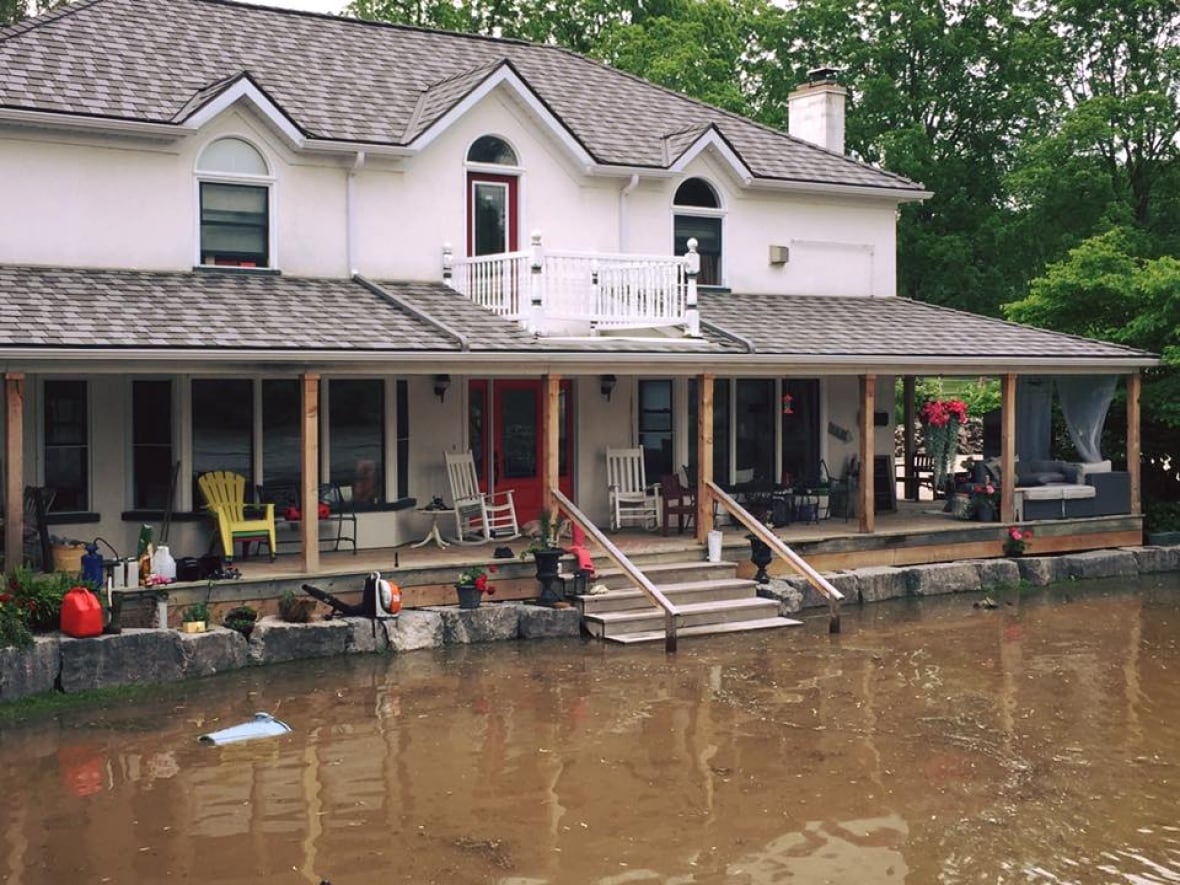Woolwich considers new flood response plan after June deluge
Report details lessons learned from June flood, actions to mitigate future damage

More road signs, more weather tracking technology and more authority to compel complacent members of the public — those are just a few of the things that are requested in a report to Woolwich councillors after flooding this past June.
The document lists in detail the lessons that emergency personnel learned from the flood, along with steps the township should take to protect residents from similar disasters in the future.
- Ontario to provide disaster aid for June storm flood victims
- Grand River Conservation Authority meets with residents following West Montrose flood
"I think if the same thing happened tonight, we're in a much better place than what we were before," Woolwich Fire Department Fire Chief Dale Martin told CBC News.
We seen water like we had never had probably since '74, when a big flood happened.- Dale Martin
His colleague Avril Tanner, who started as the township's community emergency management co-ordinator the day after the flood, said the report is not only an opportunity to learn from the past, but also a chance to improve future safety practices.
"As emergency managers, some of our goals are to prevent and mitigate risks regarding different hazards and I think that this report really helps us to achieve that," she said.
'Water like we had never had'
Local creeks, rivers and flood plains were swamped the morning of June 23, when more than 100 mm of rain fell within the span of three hours.
According to the report, "rain gauges at Luther Marsh indicated that this was the highest recorded one-day total rainfall for that area since recordkeeping began in 1950."
- Flooding in Elora, West Montrose, New Hamburg after 100mm rainfall
- Flood warning continues for southern Grand River, flood watch for northern Grand River
- Flood warning and watches ended for Grand River watershed
Areas of Woolwich that had never flooded before — roads like Arthur Street North, Golf Course Road and Hemlock Drive — were suddenly under water.
"It really didn't compare to anything that we've had in the past," Martin said. "We seen water like we had never had probably since '74, when a big flood happened."
Emergency personnel noted the water rose so fast that there was insufficient time to protect properties by setting up sand bags.

Resources stretched thin
Not only did the water overwhelm the landscape, but it also overwhelmed local resources.
"We were stretched pretty thin," Martin said, explaining how he would have to bounce back and forth between multiple flood sites. "We've just never experienced that before."
Township staff, officials from the Grand River Conservation Authority and members of the Waterloo Regional Police identified a number of challenges, including the following:
- There were not enough signs for the number of roads closed due to flooding.
- Staff spent a significant amount of time persuading residents to evacuate flooded areas, "policing" barricades and road closures, and rescuing individuals who continued to access the watershed for leisure activities when it was unsafe to do so.
- Township staff did not have access to Early Ready System information, which Environment Canada uses to warn residents of significant severe weather events.
- Flood messaging was not being received by emergency responders at a quick enough pace.
- The roles and responsibilities of different organizations and agencies during an emergency were not clearly defined.

New flood response plan
In light of these and other challenges, staff are recommending 11 practical changes to township, GRCA and WRPS operations:
- Develop a flood response plan that clearly delineates roles and responsibilities.
- Develop an information plan for getting flood messages out to the public.
- Work with community partners to develop emergency evacuation plans.
- Review existing by-laws to see if any changes are needed for flood emergencies.
- Determine whether an internal notification process is needed or add staff to the existing GRCA notification system for flood messaging.
- Determine what role the WRPS should play should another flood take place.
- The GRCA should create a flood warning map for commonly flooded areas in the township, which is updated in real time and can be viewed by the public.
- Explore the possibility of GRCA providing emergency personnel with flood messaging at a quicker pace.
- Determine what role GRCA personnel should play, should another flood take place.
- Update GRCA operations to reflect the fact that new areas of Woolwich experienced flooding.
- Host a public information session with residents of West Montrose to share flooding information and obtain feedback.